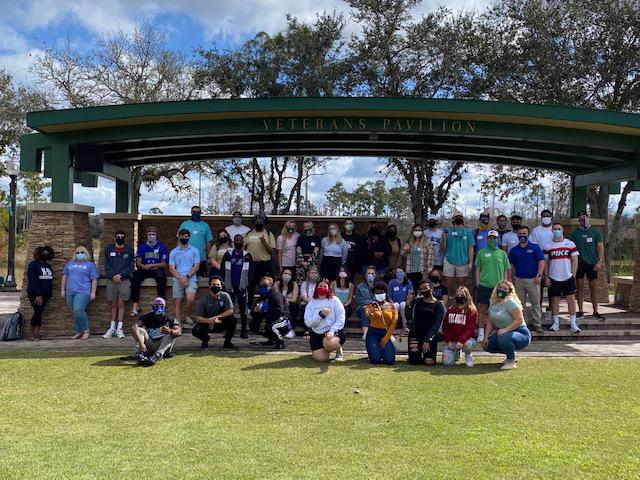There is a group of FGCU students that consistently earns above-average GPAs, performs more service hours than required, has raised more than $1 million for philanthropy and boasts members involved in every leadership position on campus.
It consists of the 1,381 members of the 28 FGCU fraternities and sororities. While representing 12 percent of the student body, the group accounts for many individual and group accomplishments since Fraternity and Sorority Life (FSL) was established at FGCU in 2003. Under the leadership of Julie Gleason, assistant dean and director of FSL, fraternities and sororities have grown tremendously.
The social component of Greek organizations is one reason people join. While in their undergraduate chapters, members develop lifelong friendships. Their brothers and sisters often serve in their wedding parties, as godparents to each other’s children and references for employment opportunities. These connections are invaluable, but there are other advantages, too.
Since 2012, the FSL community’s GPA has risen consistently. Except for two semesters, the fraternities and sororities have earned higher GPAs than the campus average.
“Academics is one of the main focuses for all organizations of NPHC,” National Pan-Hellenic Council President Shantae Clarke says. “Our council is proud to have some of the highest GPAs throughout FGCU’s FSL community.”
Additionally, members of fraternities and sororities have earned higher GPAs than the men and women on campus. During 2020, the average fraternity member GPA was 3.17 compared to the all-men’s average of 3.08. The average sorority member GPA was 3.39 compared to the all-women’s average of 3.31.
FSL organizations focus on service to the community and raising money for philanthropy as well. Whether working with national organizations like St. Jude Children’s Research Hospital or Make-A-Wish, collaborating with local organizations, or volunteering at nonprofits, fraternities and sororities are involved at FGCU and the community beyond.
Since their founding, the university’s Greek organizations have raised more than $1 million for charity. COVID-19 didn’t stop these efforts. During 2020, the community raised $90,142 through innovative virtual fundraising challenges and by adapting events to meet health and safety guidelines.
“Philanthropy is a great way to help our community,” says Panhellenic Association President Gracie Mercurio. “It’s amazing being able to spread love and raise money and awareness with a group of people who have the same goal in mind.”
While FGCU students need 80 service-learning hours to graduate, most FSL members complete this requirement during their freshman or sophomore year then keep going.
“Service to us means supporting and enriching, not only our university community, but the communities around us,” says Multicultural Greek Council President Denise Lobos. “We strive to make a wide-scale difference and be contributors to society.”
On average, an FSL member serves more than 50 hours per year, earning 207 service-learning hours before graduation.
Many chapters pride themselves on leadership as a core value, and it shows when looking at involvement statistics throughout campus. Whether it is FGCU’s top leadership positions, starting and leading student organizations, or top honors given to graduates, members of fraternities and sororities can always be found leading the way.




















